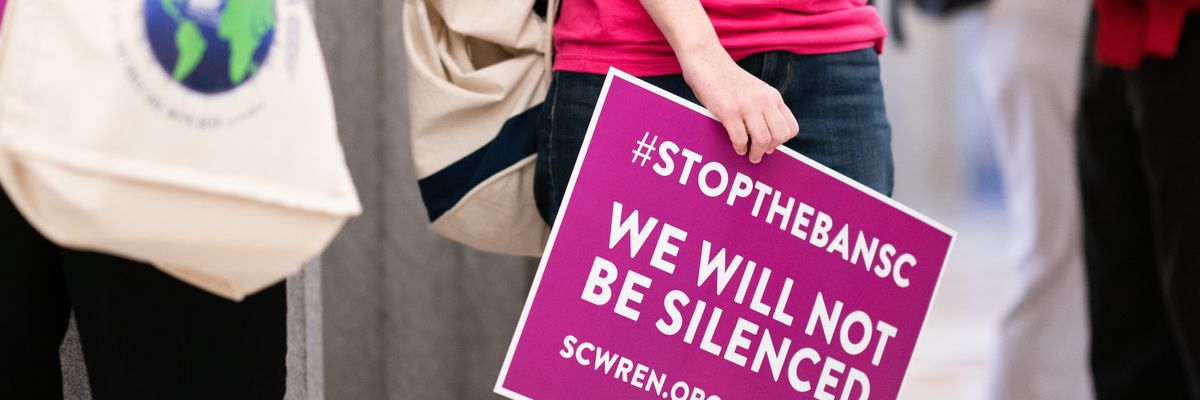To stop Republican lawmakers in South Carolina from dealing a "catastrophic blow to abortion access across the South," reproductive healthcare providers on Thursday filed a lawsuit against the state to block the six-week abortion ban that went into effect immediately after Gov. Henry McMaster signed it.
The ban (S. 474) was passed Tuesday after five women in the state Senate—the only women in the body, including three Republicans, one Democrat, and one Independent—attempted to filibuster the legislation. They were unable to persuade two other Republicans to vote against the bill, which bans abortion before many people know they are pregnant.
Planned Parenthood South Atlantic (PPSA) joined two healthcare providers and one clinic in the lawsuit; the Center for Reproductive Rights (CRR) and Planned Parenthood Federation of America (PPFA) are representing the plaintiffs.
The groups noted that S. 474 is "nearly identical" to another six-week ban that was struck down by the South Carolina Supreme Court earlier this year. The new ban contains limited exceptions for the life and health of the pregnant person and certain fetal abnormalities, and a provision under which survivors of rape and incest can ostensibly access care until 12 weeks of pregnancy, but only if their provider reports the assault and the patient's name to law enforcement.
The state Supreme Court ruled in January that an earlier six-week ban violated the right to privacy guaranteed by South Carolina's constitution.
"The South Carolina Supreme Court was clear—banning abortion after approximately six weeks was unconstitutional six months ago, and it’s still unconstitutional now," said Nancy Northrup, president and CEO of CRR. "South Carolinians' rights are once again being violated, but we will continue to fight back."
South Carolina's neighboring states, Georgia and North Carolina, have passed bans on abortion care at six weeks and 12 weeks, respectively, with North Carolina's law set to take effect on July 1.
Other states across the South have enacted total bans on abortion, including some that contain no exceptions for pregnancies resulting from rape or incest. Florida Gov. Ron DeSantis signed a six-week abortion ban earlier this year, but the law is under review by the state Supreme Court.
Alexis McGill Johnson, president and CEO of PPFA, said that unless the South Carolina Supreme Court acts again, "people across the region who rely on this state for care will suffer."
"Today, we are asking the South Carolina Supreme Court to do its job and protect people's ability to seek basic healthcare, without political interference, by quickly blocking this cruel law," said Johnson. "If S. 474 is not blocked, South Carolinians will be robbed of the freedom to control their own lives, bodies, and futures."
The groups and providers are seeking a temporary restraining order to stop the law from taking effect as well as a judgment declaring the law unconstitutional.
"State lawmakers have once again trampled on our right to make private healthcare decisions, ignoring warnings from healthcare providers and precedent set by the state's highest court just a few months ago," said Jenny Black, president and CEO of PPSA. "We will always fight for our patients' ability to make their own decisions about their bodies and access the healthcare they need. We urge the court to take swift action to block this dangerous ban on abortion."
